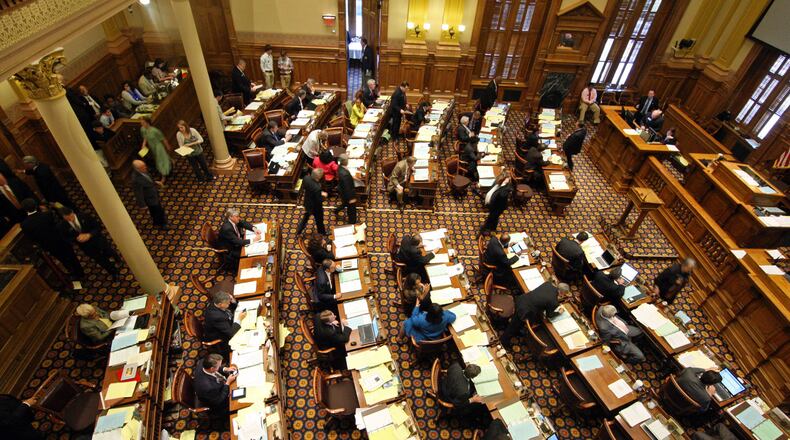The legislative session that begins next week will feature more of the education debates that have vexed lawmakers in the past.
There will be more hand-wringing over Georgia's education funding formula. Lawmakers will once more tussle over controversial national teaching guidelines. Community activists will use the fallout from school struggles in DeKalb to push for the power to carve out new school districts. And teachers hope a growing state budget will finally allow them a raise.
But there’s little consensus on many of the most troubling education issues.
Much of the frustration from teachers and administrators is over a complicated state formula that’s supposed to determine how much money districts receive. They have been getting less than it calls for since it was adopted decades ago. Deal argues the formula needs to be reworked, administrators want it fully funded, and with a November election looming there’s little chance of either happening.
What is clear, though, is that increased education funding is a guarantee in Deal’s budget proposal. He is expected to send more money to school districts and let them decide whether to use the funds for pay raises — teachers haven’t received state-backed salary increases in five years — or for other priorities. The raises would likely be between 2 and 3 percent.
“We have made progress in our state, but we still have a ways to go,” Deal said. “What we are trying to do is make sure we have adequate funds to provide teachers with the resources they need to do the best job they can. And you can expect that to increase. I can tell you that.”
It's welcome news for education officials and advocates, who say many districts are in a financial crisis, having furloughed teachers, increased class sizes and shortened the school calendar to make ends meet. Since 2002, the state has given school districts nearly $8 billion less than they were supposed to receive under the formula, called Quality Basic Education or QBE.
Most districts have received special permission to have school in session fewer than the state-mandated 180 days per academic year. Class sizes have increased as districts have cut some teacher positions or left them vacant.
“School systems throughout the state are struggling to provide a quality education to our children, having exhausted nearly all ways to compensate for those billions of dollars of lost state financial support,” said Tracey-Ann Nelson, the director of government relations for the Georgia Association of Educators.
While education officials are happy to be discussing teacher raises and not more budget cuts, some worry that Deal’s plan doesn’t go far enough. Simply giving teachers a raise — without adjusting the funding formula — would not give districts the money needed to restore days to the school calendar or end teacher and staff furloughs. Changing the funding formula would come closer to the mark, education officials say.
“QBE is the only fair and comprehensive way to direct revenue to public education. To do it any other way continues to undermine the needs of our children and the education they deserve.”
School funding will only be a part of the overall education debate.
Deal and lawmakers must also grapple with the fallout of belt-tightening for lottery-funded HOPE scholarship programs. Deal’s office said Wednesday it would establish a scholarship, named after former Gov. Zell Miller, to provide full tuition for tech college students who earn a 3.5 grade point average. Some 16,000 technical college students could immediately qualify, Deal spokesman Brian Robinson said.
Expect legislators to resume infighting over Common Core, the voluntary set of reading and math standards that has become a divisive issue in state politics. Critics worry the guidelines, a target of tea-party infused opposition, are a federal takeover of education policy.
Republican state Sen. William Ligon of Brunswick is set to push a proposal to nullify Common Core in Georgia, and he’s appeared at events across the state rallying support in the past few months. The House could soon consider a similar proposal as well.
State Rep. Tom Taylor, R-Dunwoody, and his allies will revive a push for a constitutional amendment that would allow any cities created after 2005 to forge their own school districts. The move would allow Dunwoody, Sandy Springs and other newer cities, or neighboring cities that band together, to create their own education systems.
Deal’s Republican adversaries, including Republican state Superintendent John Barge, will use the session to push their own education agendas.
“If it is the state leadership’s secret plan to slowly choke the life out of public education by reducing funding, the plan may very well be succeeding,” Barge said in an open letter to state legislators. In recent visits to rural schools, he added, he’s seen holes in walls, malfunctioning water fountains and principals who have turned off hall lights to save on utility bills.
And state Sen. Jason Carter, the Decatur Democrat running for governor, expects to unveil education proposals taking aim at Deal throughout the session.
“We are going to talk about education, about how to build the economy for the future instead of just being satisfied with today,” Carter said.
About the Author
Keep Reading
The Latest
Featured




